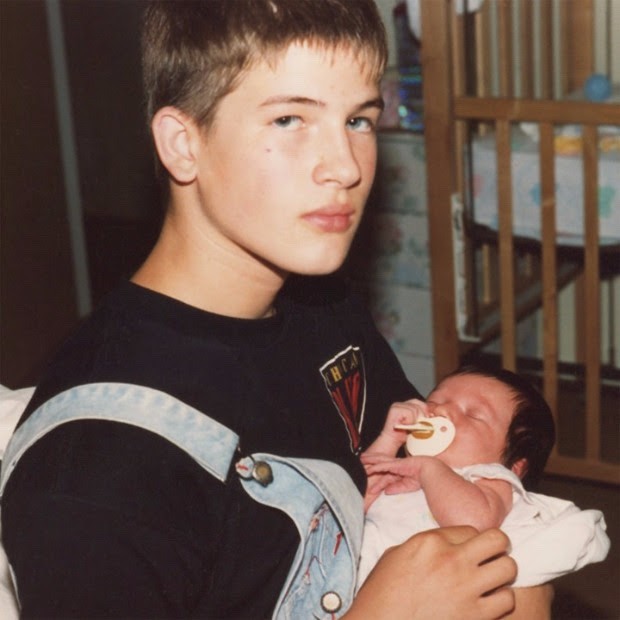The world is not exactly suffering from a drought of vaguely rootsy, slightly folk-influenced indie rock bands. There are a lot of those motherfuckers out there right now. It can't be easy for them. We're living through an era when any music, to get noticed, needs some kind of narrative hook, some elevator pitch. And a band, even a great band, can slip through the cracks if it doesn't have one of those. Consider the case of Big Thief, a Brooklyn four-piece led by Adrianne Lenker, a Minnesota transplant who made some singer-songwriter music, first on her own and then with eventual Big Thief bandmate Buck Meek, before putting the band together. Just one year ago, Big Thief released their debut album Masterpiece. In retrospect, it's a perfectly lovely piece of work. We here at Stereogum ignored it completely. I don't even know why. Sometimes, that just happens. Our bad. But no, in almost no time at all, Big Thief are back with Capacity, and their new album is a huge leap forward in just about every possible way, a record made with enormous confidence and intuition and empathy. And so this time, they do have a narrative hook, and the narrative hook is this: Big Thief are extremely fucking good at what they're doing, and they will be ignored no more.
If you were so inclined, it might be possible to describe what Big Thief do by drawing comparisons to other bands and other artists. The band's sound alternates between sparse, quiet, atmospheric, almost trancelike I-guess-you'd-call-it-folk music and lightly gnarled, expansively lovely indie rock. You might hear echoes of some of their contemporaries, of people like Kurt Vile or Kevin Morby. They don't sound similar, really, but they do the same thing where they take older American classic-rock sounds and bend them to suit their needs. The obvious comparison-point is probably Angel Olsen, someone else who combines sounds with otherworldly grace and sings with an icy self-assurance that seems to set her completely outside of linear time. At the band's most jangled and psychedelic, they remind me of groups like Helium or Lower Dens, two other bands led by singers with sharp and distinctive voices and sensibilities who can do just fine for themselves, without a band. But I could draw connecting lines all day without really conveying what makes Capacity such a striking, heavy, powerful album. So forget all that.
Sonically, this is an album that creates its own world. A whole lot of that comes from Lenker, from the simple way that she delivers her phrases. Lenker's voice is chilly and precise, so that even an inwardly directed mutter has all the clear elocution that you'd expect to hear from, say, an NPR announcer. She and fellow guitarist Meek build songs through intricate, interweaving frameworks of guitar sounds, lacing their instruments through one another. There's plenty of room for play in these songs, and they can move from the spare, haunted piano-based simplicity of penultimate track "Mary" into the casually rocking tumble of closer "Black Diamonds" without causing any sort of whiplash. The band recorded all of it on an upstate New York farm with Masterpiece producer Andrew Sarlo, with all five of them living together communally, and the album has that beautiful alchemy that you can sometimes get when musicians know each other really well, when they know how to speak to each other through the sounds they're making. And there's a reverby warmth to the recording; all of it melts together in a perfectly pleasant sort of way.
But then there's Lenker's writing, which is something other than pleasant. Lenker has a fiery force to her words; they can sooth or sting or do both at once. Sometimes, she writes with a discomfiting sexual intensity that recalls prime PJ Harvey: "There is a meeting in my thighs / Where in thunder and lightning, men are baptized / In their anger and fighting, their deceit and lies." Sometimes, she leaves you with truly vivid images and leaves it to you to decode them: "He cut off my oxygen / And my eyes were watering / As he tore into my skin like a lion." And she can also tell stories. I love how she paints youthful abandon on the lightly dissonant "Shark Smile": "Evelyn’s kiss was oxygen / I leaned over to take it in as we went howling over the edge of South Des Moines." One line later, Evelyn and Lenker are crashing their car, Lenker's own version of a double-decker bus crashing into us.
And then there's "Mythological Beauty." You know how you can hear a song a bunch of times, like it, and then find out what it's about and feel your whole world shift? That's "Mythological Beauty" for me. There's just a hint of krautrock in "Mythological Beauty," in the way the guitars gently wind themselves around the flat, muted patter of the drums. Lenker's voice makes all sorts of sharp, unexpected melodic turns in the song, and she almost shrugs them off, like they're no big deal. (It's something she does again and again on the album.) On "Mythological Beauty," Lenker's voice is a far-off murmur, as if she's turning an object over in her hands, distractedly contemplating it. Until I read the lyrics, I always got caught up on the opening lines: "You have a mythological beauty / You have the eye of someone I have seen / Outside of ordinary situations / Even outside of dreams." She could be singing about a lover, or an admired friend, or a face in a magazine that draws her in. But she's not. She's singing about her mother.
In quick little lyrical sketches over the course of the song, Lenker tells a whole life story, and she does it with a painterly eye and a strange sense of generosity. She sings about her mother having a baby as a teenager and then giving that baby up for adoption: "You gave Andrew a family who you thought could love and take better care / I have an older brother I don’t know / He could be anywhere." Later on, Lenker sings about being a child, playing in a trash-strewn back yard, cutting her head open on a piece of metal: "You held me in the backseat with a dishrag, soaking up blood with your eye / I was just 5, and you were 27, praying, 'Don’t let my baby die.'" Lenker doesn't spell anything out on that song; she's strikingly direct and undramatic. But in telling that story, she evokes the entire idea of family, of fucked-up people who care for each other enormously, of acknowledging people's issues and feeling all-consuming love all the same. "Mythological Beauty" just wrecks me. It is one goddamn hell of a song. And a band that can come up with a song like that deserves to be heard, convenient narrative hooks or no.
Capacity is out 6/9 on Saddle Creek. Stream it at NPR, and read our interview with Lenker here.
[videoembed size="full_width" alignment="center"][/videoembed]
[videoembed size="full_width" alignment="center"][/videoembed]
[videoembed size="full_width" alignment="center"][/videoembed]
Other albums of note out this week:
• Phoenix's reliably efficient cool-guy return Ti Amo.
• Sufjan Stevens, Bryce Dessner, Nico Muhly, and James McAlister's astronomical concept LP Planetarium.
• SZA's long-awaited full-length R&B debut Ctrl.
• Rancid's as-yet-unheard punk rock revival meeting Trouble Maker.
• TOPS' dreamy psych-popper Sugar At The Gate.
• London Grammar's torch-song collection Truth Is A Beautiful Thing.
• Slow Dancer's smooth-crooner debut In A Mood.
• Agent blå's revved-up indie-pop debut Agent Blue.
• Kirin J Callinan's sketchy warped-pop purr Bravado.
• Katy Perry's thrashing-for-relevance, too-big-to-fail Witness.
• Old Fleetwood Mac bandmates Lindsey Buckingham and Christine McVie's self-titled duets album.
• Gunplay's street-rap snarler The Plug.
• Chuck Berry's final document Chuck.
• Glen Campbell's probably-final document Adiós.
• Necrot's death metal opus Blood Offerings.
• Ani DiFranco's self-assured folk return Binary.
• Holy Oak's folky, story-centric Second Son.
• Eerie Gaits' ambient guitar-instrumental debut Bridge Music.
• Logic Of Denial's death metal shit-ripper Aftermath.
• Former Dirty Projector Brian McOmber's score for the movie It Comes At Night.
• The soundtrack to the PBS blues docu-series The American Epic Sessions.






